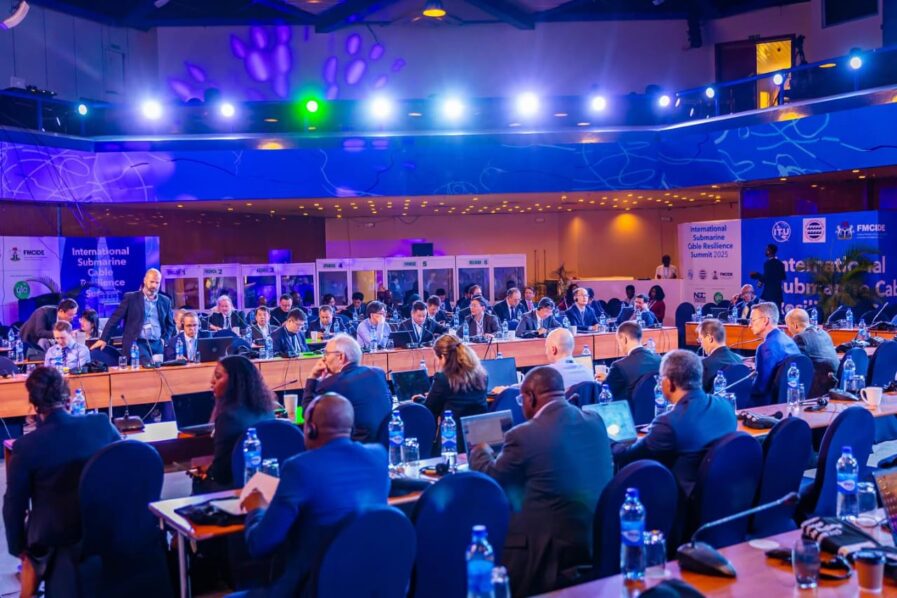
Abuja recently hosted the Subsea Resilience Summit, a landmark event that brought together global leaders in telecommunications to address the pressing challenges of submarine cable resilience. Organized by the International Telecommunication Union (ITU), the summit came at a crucial time when West Africa’s digital infrastructure faced increasing threats, from natural disasters to cybersecurity vulnerabilities
The event also led to the adoption of the Summit Declaration, a strategic document outlining guidelines to strengthen the resilience of submarine infrastructure. This declaration is a decisive step towards international cooperation and technological innovation, offering a shared vision to meet future challenges. It also emphasises the importance of targeted investments and coordinated policies to ensure the security and efficiency of global networks.
Among the distinguished voices that shaped the conversation was Dr. Oscar Ondo, CEO of GITGE (www.gitge.com), a key player in Africa’s digital transformation. Representing Equatorial Guinea, Dr. Ondo advocated for a more integrated and resilient approach to subsea cable management, ensuring that the continent’s connectivity remained strong in the face of growing challenges.
A Vision for Digital Resilience in Africa
In an exclusive interview with The Guardian Nigeria, Dr. Ondo emphasized that Africa’s digital future depended on the strength of its connectivity infrastructure, highlighting that strategic investments and international collaborations are essential to accelerate technological development and support global economic growth.
“The subsea cable network is the backbone of our digital economy. Any disruption has far-reaching consequences, not just for internet access but for financial transactions, e-governance, and cross-border collaboration,” he noted.
Ten years ago, GITGE launched a digital movement that positioned Equatorial Guinea at the forefront of efforts to strengthen digital resilience. Through strategic investments in subsea infrastructure, particularly its connection to major international cable systems, the country secured a key role in regional telecommunications stability. Now, it is time to drive new investments to reinforce its leadership in the CEMAC region. Looking forward, government and private stakeholders must collaborate to harness technologies, fostering innovation and sustainable growth in the digital realm.
“Africa’s digital transformation cannot be achieved in isolation. We need stronger cooperation among countries, telecom operators, and regulators to create a unified, resilient network. The Abuja summit was a crucial platform for advancing this dialogue,” he added.
The Role of Equatorial Guinea in Strengthening Subsea Networks
From Equatorial Guinea, one of the most influential voices in Central Africa in the discussion on improving connectivity was heard. “By leveraging subsea infrastructure, our nations can use cables to bridge the digital divide. However, as a continent, we still face risks such as cable cuts, latency issues, and geopolitical tensions that impact data traffic routes”, said Dr. Ondo. He believed that tackling these challenges required a combination of technical innovation, policy reforms, and international collaboration.
“At GITGE, we are not just dealing with infrastructure; we are actively working to raise awareness within our government about the decisive and urgent need to shape policies that ensure long-term resilience. We are advocating for new investments in technology, shared infrastructure usage, alternative sources of resilience, network expansion, continuous maintenance, and system upgrades”.
Dr. Ondo further stressed the importance of integrating digital infrastructure into Equatorial Guinea’s broader economic strategy:
“We recognize the government’s strong efforts toward economic diversification and industrialization, but we also know that without enhancing our digital infrastructure, we will not achieve results as fast or as effectively as we have the potential to. There are many ways to approach this, but now was the time to launch a unified and strategic plan”.
A Call for Collective Action
The Subsea Resilience Summit in Abuja yielded key policy recommendations and commitments from both public and private sector stakeholders. Dr. Ondo emphasized that ensuring Equatorial Guinea’s digital resilience could not be the sole responsibility of telecom operators. Instead, governments had to play a proactive role in regulatory frameworks that incentivized investment in redundancy mechanisms and emergency response protocols. Moreover, participants recognized that establishing collaborative partnerships and investing in emerging technologies were essential to secure a digital infrastructure resilient to natural and cyber threats.
“We need to move beyond reactive measures. I trust that African governments were conscious that the future of our digital economy depended on how well we prepared,” he concluded.
As discussions unfolded in Abuja, Equatorial Guinea’s participation highlighted a broader African effort to build a secure and sustainable digital infrastructure. The Subsea Resilience Summit was more than just a technical gathering – it represented a decisive moment for shaping the future of connectivity on the continent. In addition, the summit catalyzed regional partnerships and spurred investments in innovative technologies, empowering governments and industry leaders to overcome challenges and accelerate digital transformation.






